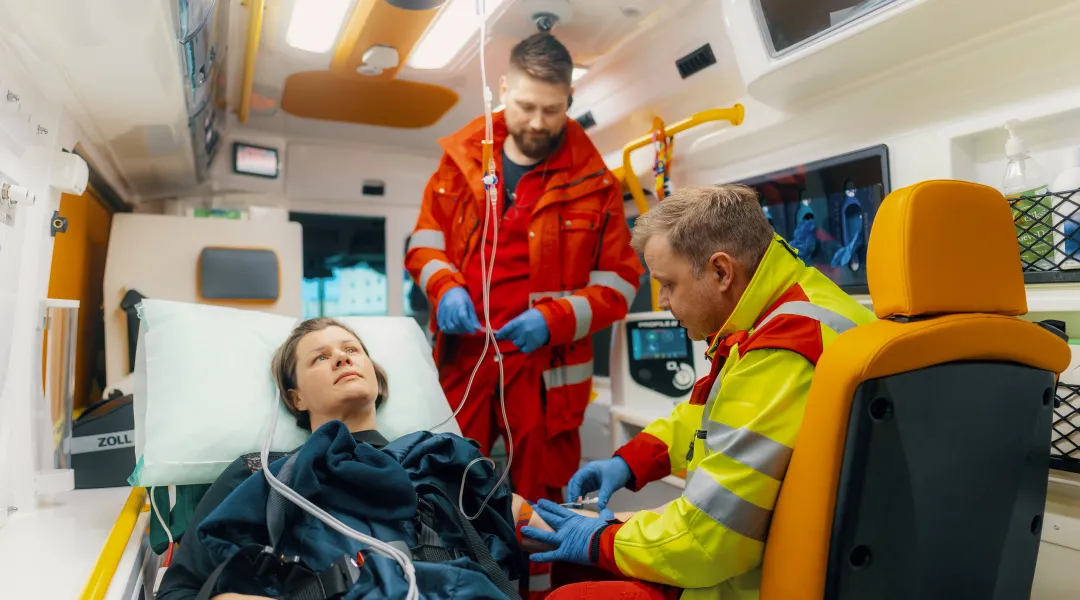The employer has offered a pay increase of 0% for 2024. In other words, no increase whatsoever. National Conciliator Anu Sajavaara has so far aligned herself with the employer, citing the so-called general level, on which the so-called pay gap act is currently being discussed in Parliament.
The employers’ and the conciliator’s view of the general level is very strange
The emergency medical services sector agreed on a long-term rescue programme in 2022 — extending to 2029 — with the aim of bringing wages and salaries of paramedics in the private sector up to the same level as the job-specific pay of paramedics in wellbeing services counties. The rescue programme was agreed on top of the normal pay increases (at the level of the so-called export industries) and for the justified purpose mentioned above.
Now, in 2024, the Finnish Association of Private Care Providers HALI and Suomen Sairaankuljetusliitto SSK, as well as National Conciliator Anu Sajavaara, argue that the rescue programme’s 2.7% increase paid in 2023 already meets the so-called general level of pay increases, and there is no need for any pay increases in 2024.
The employers and the conciliator seem to have forgotten the purpose for which the rescue programme was put in place. Together, they bend like acrobats, forcing the overall solution agreed upon in the previous round of negotiations to fit into the general level they are after, cutting up the previous round’s agreement into pieces and ignoring the reasons for the agreed increases.
Nothing that was agreed upon seems to be sacred, and the agreements made by HALI’s negotiators in the past cannot be trusted.
Anyone can understand why Tehy cannot accept such a proposal now or in the future.
The private emergency medical services sector provides services to the public sector
The private sector is funded by the public sector. It is inconceivable that a service outsourced by the public sector should be provided under cheaper employment conditions than the wellbeing services counties’ own activities. Private sector paramedics must be paid at least as much as public sector paramedics.
Currently, private sector paramedics are paid hundreds of euros less than their public sector counterparts. This cannot continue. For this reason, both the continuation of the private emergency medical services sector’s rescue programme and appropriate pay increases for each year are justified demands.
The employer side has argued that they cannot afford the pay increases. This is a lousy and untenable argument, as the employers themselves agree on the prices of the services they provide with the wellbeing services counties and HUS. The rescue programme has been known to the employers since 2022.
The private sector paramedics’ strike was due to start on Wednesday. Associate Professor Markku Kuisma, Medical Director of Emergency Medical Services at HUS, asked the National Conciliator about the possibility of getting Tehy to postpone the strike in order to safeguard a critical basic service for society during exceptional weather conditions.
Kuisma explained that very heavy snowfall and up to 28 cm of snow had been forecast for Wednesday in Uusimaa and Thursday in Pirkanmaa. Kuisma noted that the first heavy snowfall each winter always causes traffic chaos, significantly slowing down emergency medical services, and leads to road accidents and a large number of falls. Therefore, emergency medical services must have all possible resources at their disposal on Wednesday and Thursday.
Tehy was made aware of this request on Tuesday and did what a responsible trade union should do. We agreed to the request — provided of course that the mediation is resumed immediately.
The employer members of HALI ry and SSK ry, who run private businesses, should of course have taken the Finnish winter and the possibility of snowstorms into account, but they have not. Instead of the employers, HUS approached Tehy for help. We helped this time, but the labour dispute is not over.
We hope that Tehy’s responsible actions will be taken seriously by the employer side and the National Conciliator’s Office. When we resume the mediation process, we expect that the zero increase line will be off the table and we will discuss actually appropriate pay increases for the paramedics who do vital work.
If our demands fall on deaf ears, we have no choice but to issue a new strike warning.

